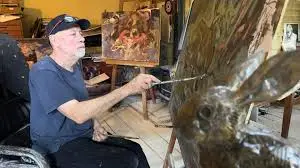An artist diagnosed with Parkinson’s said his condition gave him the drive to keep working.
Andrew Haslen, 70, from Lavenham, in Suffolk, was diagnosed with the brain disease in 2014.
He has been painting all his life, but following his diagnosis turned to sculpting to ensure he could create additional work to sell to secure his future.
In October, several of his pieces were included in the Society of Wildlife Artists’ annual exhibition in London.
“When I first started painting I just did it for myself,” Mr Haslen explained.
“I drew things I was interested in like aeroplanes but I’ve always lived in the countryside and I’ve always been interested in nature.
“I eventually started drawing birds and animals but it wasn’t until I showed some [paintings] in the pub one Friday night and someone offered to buy one, which I couldn’t believe.
“From that point, I used painting for extra beer money, nothing more than that.”
The artist said his career progressed from there when he developed his own style before going on to become one of the UK’s leading wildlife artists.
In 1988 he was also elected as a Society of Wildlife Artists member.
Mr Haslen’s Parkinson’s diagnosis, 10 years ago, left him worried about his future as an artist.
“It first appeared in my right hand, and at one point, I couldn’t write my name,” he said.
“I decided I would learn to do it with my left hand and after about six months the tremor went to my left hand so I abandoned that.
“The medication I’m on works quite well.
“Talking to people I get this involuntary movement, that is caused by the medication, not the Parkinson’s. So the Parkinson’s is controlled and I can use my hands again so I can sign my name.”
Mr Haslen said he worked seven days a week to create his paintings and sculptures and had a sense of urgency due to his condition.
“With my Parkinson’s, I don’t know what the future is,” he continued.
“With bronzes (sculptures) it’s an addition so if I get to a point where I can’t paint or I can’t work, I’ll still be able to sell work from the additions.
He found “it’s easier to cover up mistakes in the clay” and added: “Time is running out and I don’t know when I’ll be stopped so it makes me work longer hours.”
He told the BBC he had no plans to stop “anytime soon”.
His pieces will be exhibited at the Society of Wildlife Artists exhibition at Mall Galleries in London from 17-27 October./BBC.COM





More Stories
Cowboy_prank in Melbourne and Brisbane . super funny reactions. lelucon statue prank. luco patung
‘Who are you?’ An artist confronts photos of her father’s past lovers
Christie’s First 21st Century Day Sale at New Hong Kong HQ Sees Middling Results